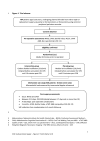Efficacy and safety of carbon dioxide insufflation for brain protection for patients undergoing planned left-sided open heart valve surgery: protocol for a multicentre, placebo-controlled, blinded, randomised controlled trial (the CO2 Study)
- PMID: 37197819
- PMCID: PMC10193051
- DOI: 10.1136/bmjopen-2023-074221
Efficacy and safety of carbon dioxide insufflation for brain protection for patients undergoing planned left-sided open heart valve surgery: protocol for a multicentre, placebo-controlled, blinded, randomised controlled trial (the CO2 Study)
Abstract
Introduction: Brain injury is common following open heart valve surgery. Carbon dioxide insufflation (CDI) has been proposed to reduce the incidence of brain injury by reducing the number of air microemboli entering the bloodstream in surgery. The CO2 Study will evaluate the efficacy and safety of CDI in patients undergoing planned left-sided open heart valve surgery.
Methods and analysis: The CO2 Study is a multicentre, blinded, placebo-controlled, randomised controlled trial. Seven-hundred and four patients aged 50 years and over undergoing planned left-sided heart valve surgery will be recruited to the study, from at least eight UK National Health Service hospitals, and randomised in a 1:1 ratio to receive CDI or medical air insufflation (placebo) in addition to standard de-airing. Insufflation will be delivered at a flow rate of 5 L/min from before the initiation of cardiopulmonary bypass until 10 min after cardiopulmonary bypass weaning. Participants will be followed up until 3 months post-surgery. The primary outcome is acute ischaemic brain injury within 10 days post-surgery based on new brain lesions identified with diffusion-weighted MRI or clinical evidence of permanent brain injury according to the current definition of stroke.
Ethics and dissemination: The study was approved by the East Midlands-Nottingham 2 Research Ethics Committee in June 2020 and the Medicines and Healthcare products Regulatory Agency in May 2020. All participants will provide written informed consent prior to undertaking any study assessments. Consent will be obtained by the principal investigator or a delegated member of the research team who has been trained in the study and undergone Good Clinical Practice training. Results will be disseminated through peer-reviewed publications and presentations at national and international meetings. Study participants will be informed of results through study notifications and patient organisations.
Trial registration number: ISRCTN30671536.
Keywords: cardiac surgery; clinical trial; delirium & cognitive disorders; magnetic resonance imaging; stroke.
© Author(s) (or their employer(s)) 2023. Re-use permitted under CC BY-NC. No commercial re-use. See rights and permissions. Published by BMJ.
Conflict of interest statement
Competing interests: CR, GDA and BG received support from the National Institute for Health and Care Research for the project associated with this manuscript, which was paid to the University of Bristol. RT, MP, LC, ML and SK received support from the National Institute for Health and Care Research for the project associated with this manuscript, which contributed to their salary. PP, NV and RS received support from the National Institute for Health and Care Research for the project associated with this manuscript, which was paid to the University of Oxford. EA received support from the National Institute for Health and Care Research for the project associated with this manuscript, which was paid to the RS reports ad hoc payments for providing expert testimony for the Parliamentary & Health Service Ombudsman. RS is the director and shareholder of Oxford Heart Surgery, chairs the Intercollegiate Speciality Board on Cardiothoracic Surgery, and is a member of the Special Advisory Committee in Cardiothoracic Surgery for the Royal Surgery Colleges. RS is an honorary secretary of the Society for Cardiothoracic Surgery in Great Britain and Ireland. No other conflicts were reported.
Figures

Similar articles
-
Safety and Efficacy of Imatinib for Hospitalized Adults with COVID-19: A structured summary of a study protocol for a randomised controlled trial.Trials. 2020 Oct 28;21(1):897. doi: 10.1186/s13063-020-04819-9. Trials. 2020. PMID: 33115543 Free PMC article.
-
Comparison of the effectiveness and safety of a new de-airing technique with a standardized carbon dioxide insufflation technique in open left heart surgery: a randomized clinical trial.J Thorac Cardiovasc Surg. 2011 May;141(5):1128-33. doi: 10.1016/j.jtcvs.2010.07.013. Epub 2010 Sep 3. J Thorac Cardiovasc Surg. 2011. PMID: 20817209 Clinical Trial.
-
Carbon dioxide flushing versus saline flushing of thoracic aortic stents (INTERCEPTevar): protocol for a multicentre pilot randomised controlled trial.BMJ Open. 2023 Apr 27;13(4):e067605. doi: 10.1136/bmjopen-2022-067605. BMJ Open. 2023. PMID: 37105705 Free PMC article.
-
Testing the efficacy and safety of BIO101, for the prevention of respiratory deterioration, in patients with COVID-19 pneumonia (COVA study): a structured summary of a study protocol for a randomised controlled trial.Trials. 2021 Jan 11;22(1):42. doi: 10.1186/s13063-020-04998-5. Trials. 2021. PMID: 33430924 Free PMC article.
-
Carbon Dioxide Insufflation During Cardiac Surgery: A Meta-analysis of Randomized Controlled Trials.Semin Thorac Cardiovasc Surg. 2017 Autumn;29(3):301-310. doi: 10.1053/j.semtcvs.2017.05.002. Epub 2017 May 23. Semin Thorac Cardiovasc Surg. 2017. PMID: 29195572 Review.
Cited by
-
2024 EACTS/EACTAIC/EBCP Guidelines on cardiopulmonary bypass in adult cardiac surgery.Eur J Cardiothorac Surg. 2025 Feb 4;67(2):ezae354. doi: 10.1093/ejcts/ezae354. Eur J Cardiothorac Surg. 2025. PMID: 39949326 Free PMC article. No abstract available.
-
2024 EACTS/EACTAIC/EBCP Guidelines on cardiopulmonary bypass in adult cardiac surgery.Interdiscip Cardiovasc Thorac Surg. 2025 Feb 5;40(2):ivaf002. doi: 10.1093/icvts/ivaf002. Interdiscip Cardiovasc Thorac Surg. 2025. PMID: 39949317 Free PMC article. No abstract available.
-
2024 EACTS/EACTAIC/EBCP Guidelines on cardiopulmonary bypass in adult cardiac surgery.Br J Anaesth. 2025 Apr;134(4):917-1008. doi: 10.1016/j.bja.2025.01.015. Epub 2025 Feb 14. Br J Anaesth. 2025. PMID: 39955230 Free PMC article.
References
-
- SurgerySfC . National cardiac surgery activity and outcomes report 2002–2016. Soc Cardio Surg 2020.
Publication types
MeSH terms
Substances
LinkOut - more resources
Full Text Sources
